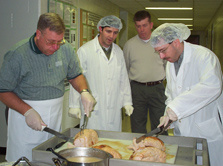Food Processing and Quality Enhancement
 Our goal is to improve the quality, safety, nutritional value and demand for meat, fruit, vegetable, dairy and cereal products. For example, we are working to improve the efficiency of meat production by nutritional and hormonal optimization of muscle growth in meat-producing animals. We study the structural, compositional and metabolic basis for muscle function and their relationship to the ultimate quality of muscle as a food.
Our goal is to improve the quality, safety, nutritional value and demand for meat, fruit, vegetable, dairy and cereal products. For example, we are working to improve the efficiency of meat production by nutritional and hormonal optimization of muscle growth in meat-producing animals. We study the structural, compositional and metabolic basis for muscle function and their relationship to the ultimate quality of muscle as a food.
We are working to expand the use of underutilized commodities, using by-products of the meat and dairy processing industries. For example, we are developing protein films using whey protein isolate and concentrates, an underutilized by-product of the cheese industry. Another focus is to determine how the biochemical and physical properties of foods influence their quality and safety.
We are looking at the relationship between the biochemical properties of meat and cereal proteins and how these proteins function in processed meat products and grain-based goods. We are studying the underlying mechanisms of protein gelation and emulsification, two functional properties critical in many food products. Several projects have been in cooperation with the cherry industry in Michigan to develop new products, improve existing products and develop new uses for cherries. One project looked at the antioxidant activities of selected cherry components. Much of this research can lead to expanded markets for Michigan agricultural products.
Sensory Science and Consumer Research
The Sensory Science and Consumer Research program focuses on contributing a deeper understanding of what factors influence sensory perception and eating behavior. Current research areas include: 1) combining sensory evaluation with flavor chemistry and physicochemical analysis (GC-MS, GC-Olfactometry, texture, color, etc.) for a better understanding of food and consumers; 2) understanding sensory perception associated with environmental and psychological factors; 3) measuring sensory perception in relation to consumer behavior; 4) developing innovative food products; and 5) integrating sensory and consumer sciences in health and wellness. These approaches can lead to discovery of the internal and external factors influencing eating behavior, which can be used to promote healthy eating habits and ultimately to improve physical and mental well-being of consumers.

Participating Faculty

Kirk D. Dolan
Professor
dolank@msu.edu
517-353-3333

Emily Mayhew
Assistant Professor
mayhewem@msu.edu
517-884-0046

Jeff Swada
Associate Professor, Director of Undergraduate Studies, Director of Undergraduate Food Science Program, Food Science Undergraduate Academic Advisor, Food Processing Complex Manager and Mobile Lab Liaison
swadajef@msu.edu
517-884-5993

Zeynep Ustunol
Professor Emeritus
ustunol@msu.edu
517-353-3411



 Print
Print Email
Email